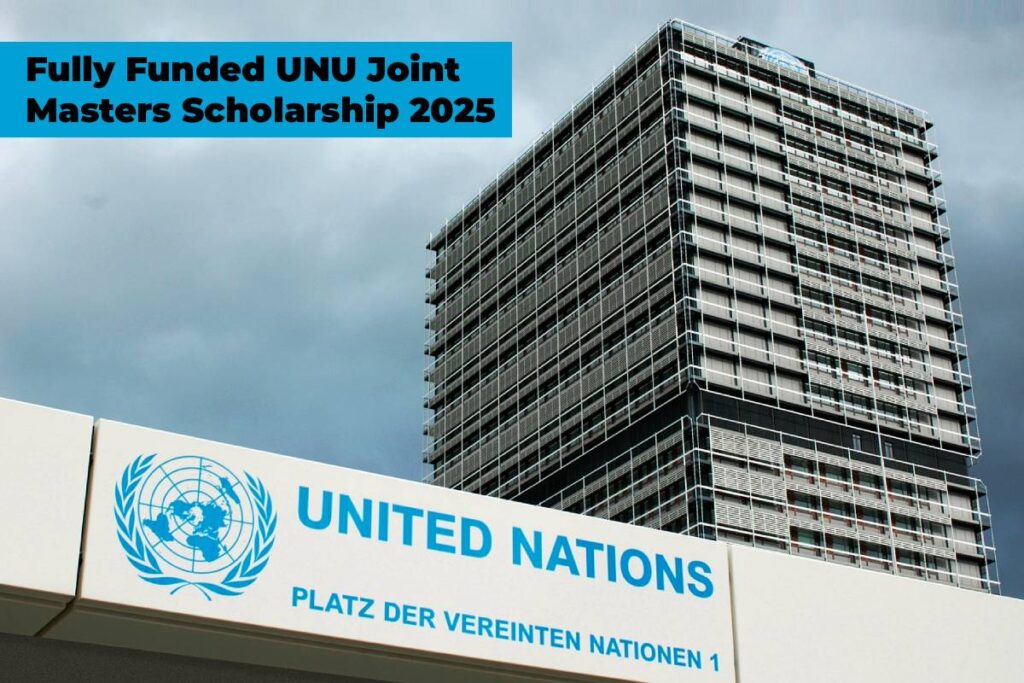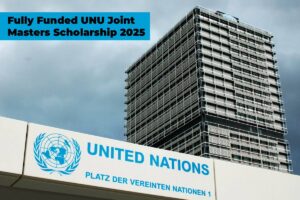
2025 Fully Funded UNU Joint Masters Scholarship
Imagine standing at the edge of a flood-ravaged village in the Global South, not as a bystander, but as a leader armed with the knowledge to rebuild stronger.
Or picture yourself briefing UN policymakers on climate adaptation strategies, your voice shaping resilient communities worldwide.
This isn’t a distant dream, it’s the reality awaiting those who seize the Fully Funded UNU Joint Masters Scholarship 2025. Offered by the United Nations University (UNU) and the University of Bonn, this transformative program equips you to tackle environmental risks and human security head-on.
If you’re passionate about turning vulnerability into resilience, this could be the launchpad for your life’s most meaningful work.
In a world reeling from climate crises, disasters, and inequality, the UNU Joint Masters Scholarship stands out as a beacon of hope. It’s more than a degree, it’s a call to action for changemakers from developing countries.
With applications opening September 15, 2025, now’s the time to step up. In this guide, we’ll explore why this fully funded environmental master’s programme is a game-changer, how it aligns with your aspirations, and exactly how to apply for the UNU scholarship 2025.
Let’s walk through the details and see how this opportunity could redefine your path.
What is the UNU Joint Masters Scholarship?
At its core, the UNU Joint Masters Scholarship funds the two-year MSc in Geography of Environmental Risks and Human Security.
Jointly delivered by UNU’s Institute for Environment and Human Security (UNU-EHS) and the University of Bonn’s Department of Geography, it’s designed for those ready to bridge theory and action.
Starting October 2026 in Bonn, Germany, the program immerses you in a multicultural hub where UN experts and top academics collaborate.
Why does it feel life-altering? Picture this: 279 alumni from 46 countries since 2013, now leading disaster risk reduction at NGOs, shaping climate policy at federal agencies, or innovating sustainable development in private sectors.
This isn’t just education, it’s a network of global influencers, with built-in internships (at least eight weeks) and strong ties to the UN system.
Whether you’re from Nigeria envisioning flood-proof communities or from India pioneering drought-resilient agriculture, this program empowers you to lead where it matters most.
Key highlights for quick reference:
- Duration: 2 years (12 modules + internship + thesis).
- Location: Bonn, Germany – a UN city pulsing with international energy.
- Focus: Vulnerability assessment, ecosystem services, disaster management, climate adaptation, GIS/remote sensing, and more.
- Intake: One per year; next application deadline: December 15, 2025.
As one alumnus shared, “This scholarship didn’t just fund my studies—it ignited my purpose. Today, I’m advising on humanitarian aid in crisis zones.” If that sparks something in you, read on.
Why Choose This Fully Funded Environmental Master’s Programme?
In an era where environmental risks threaten millions, think rising seas displacing families or wildfires erasing livelihoods, the fully funded environmental master’s programme at UNU equips you with the tools to fight back.
It’s not generic academia; it’s interdisciplinary firepower blending geography, social sciences, and Earth system science.
You’ll master qualitative/quantitative methods, socio-hydrology, and future studies, all with a laser focus on the Global South.
What sets it apart? A “strong focus on developing countries” means real-world relevance: Case studies from Africa, Asia, and Latin America, plus hands-on projects with UN partners.
The compulsory internship? It’s your proving ground—perhaps analyzing flood risks in Bangladesh or designing resilience plans for Pacific islands.
Graduates land roles in humanitarian aid, climate research, or policy, with exposure to organizations like the Red Cross or World Bank.
Emotionally, it’s aspirational gold: Imagine the pride of defending your thesis on human-nature relationships, knowing it could safeguard vulnerable communities.
Practically, the DAAD EPOS scholarship (via this program) covers tuition, living expenses, travel, and health insurance, freeing you to focus on impact, not invoices.
For 2025 applicants, this means up to 10 fully funded spots for those with 2+ years of post-grad work experience in development fields.
Pro tip: If you’re eyeing a career pivot, this program’s alumni showcase on LinkedIn is your inspiration board, real stories of lives redirected toward purpose.
Eligibility for the UNU Joint Masters Scholarship 2025
Dream big, but know the bar: The program seeks driven minds with a bachelor’s in geography or related fields (e.g., environmental sciences, development studies).
The program is designed for those blending human geography, research methods, and Earth sciences, so pure engineering or International Relations (IR) backgrounds generally aren’t a fit.
Key requirements at a glance:
- Academic Background: Bachelor’s (or equivalent) with majority courses in human geography/social sciences, empirical methods, and physical geography/environmental sciences. GPA emphasis on relevance.
- Professional Edge: At least 2 years post-grad experience (for EPOS funding)—think NGO work, policy roles, or research in sustainability.
- English Proficiency: TOEFL (79 iBT), IELTS (6.5), or equivalent (natives from AUS/CAN/UK/IRE/NZ/US are exempt).
- Motivation: A burning drive for human security and environmental risk management—proven in your detailed 1-2 page motivation letter.
- Age/Other: Graduated within 6 years; no prior similar master’s degree; committed to a practitioner career (not a PhD track).
If you’re from the Global South, you’re prioritized. This selectivity ensures a cohort of high-impact peers, your future collaborators.
How to Apply for UNU Scholarship 2025: Your Step-by-Step Roadmap
Applying feels daunting, but break it down, and it’s your ticket to transformation. The application window is September 15 to December 15, 2025.
All materials must be submitted via email to [email protected] as one single PDF (under 8MB). No paper applications are accepted, digital only.
Here’s your actionable guide:
- Complete the Online Form: Find the form on the UNU site, fill it out, sign/date, and scan the confirmation. It’s your official entry ticket.
- Craft Your Motivation Letter (1-2 Pages): Pour your soul into this, link your background to the program’s curriculum, explain your passion for the Global South, and outline your vision post-graduation. For EPOS funding: Be sure to explain your ties to development, and why DAAD/Germany is important for your goals.
- Polish Your Europass CV (Max 3 Pages): Ensure it’s reverse-chronological, dated, with precise work and academic timelines.
- Gather Transcripts and Degrees: Provide English/German originals or certified translations. Include grading scales; EPOS requires official stamps.
- Prove English Skills: Attach your TOEFL/IELTS scan or exemption documentation.
- Add References (Optional but Smart): Up to two academic letters (stamped/signed) are recommended, plus a professional reference for EPOS applicants.
- Scan Your Passport: Include the name page only.
- For EPOS Hopefuls: Include the signed DAAD checklist, the typed DAAD application form, an extra motivation letter, work certificates (totaling 2+ years), and the professional reference.
- Academic Writing Sample (Separate PDF): Answer the question: “To what extent do the SDGs address environmental risk, and which modifications would you suggest for a post-2030 agenda?” (Maximum 1000 words, APA references, interdisciplinary approach). This must be your original work, as plagiarism checks apply.
- Hit Send: Rename the file [LastName.FirstName].pdf. If you are from China, India, or Vietnam, remember to attach your APS certificate.
Timeline: Shortlist notifications typically go out by February 2026, with final selections by April. Pro tip: Start gathering documents now to avoid the holiday rush.
The Fully Funded Perks: Study in Germany for Free and Beyond
Securing the UNU Joint Masters Scholarship means zero financial barriers. The DAAD EPOS funding covers:
- Full tuition and enrollment fees.
- A generous monthly stipend (€934).
- Travel allowance to and from Germany.
- Health, accident, and liability insurance.
- Family allowance (if applicable).
If you’re not eligible for EPOS, self-funding options or other DAAD scholarships are worth exploring.
Either way, Bonn’s vibrant scene, UN cafes, Rhine walks, becomes your classroom. The real ROI? Lifelong networks and skills that command global roles.
Real Stories: How This Scholarship Ignited Careers
Meet Aisha from Kenya: A development worker pre-program, she interned with UNDRR and now leads climate adaptation at an African NGO.
“This wasn’t just a master’s, it was my superpower against inequality.” Or Raj from Bangladesh: His thesis on flood resilience landed him a role at the World Bank.
These aren’t outliers; they’re the norm for UNU graduates.
Your story starts here: What if this program turned your local passion into global change?
FAQ: Quick Answers on UNU Joint Masters Scholarship 2025
- What is the deadline to apply for UNU scholarship 2025? December 15, 2025—mark it!
- Is the UNU Joint Masters Scholarship fully funded? Yes, via DAAD EPOS for eligible applicants; it covers everything from tuition to living costs.
- Can I apply if I don’t have 2 years of work experience? For EPOS funding, the 2-year minimum is required. Self-funding applicants need strong academics and motivation.
- What fields does the fully funded environmental master’s programme cover? Vulnerability, disaster management, GIS, climate adaptation, and human security—interdisciplinary excellence.
- How competitive is the UNU Joint Masters Scholarship? It is selective (only 10 EPOS spots), so ensure your unique Global South perspective and experience truly shine.
Your Next Step: Seize the UNU Opportunity Today
The clock’s ticking, September 15, 2025, applications open. Don’t let environmental risks define tomorrow; redefine them.
Visit UNU’s official page for the form. Email [email protected] with questions.
This UNU Joint Masters Scholarship isn’t just funding, it’s your invitation to build a legacy. What’s stopping you from applying?
Share your thoughts below, and let’s build a resilient world together.
#UNUScholarship #EnvironmentalMasters #StudyInGermany
.
At Facts and Tips, we strive for accuracy and honesty.
If you notice any errors, whether factual, editorial, or outdated information, please don't hesitate to contact us.
Found this article about UNU Joint Masters Scholarship 2025 informative and useful? Share it with your friends and colleagues, they might find it helpful too!
Last updated: September 26, 2025. Always verify deadlines and requirements on official sites




